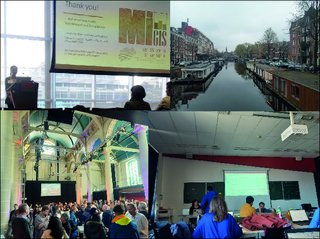The International Conference on Computer Applications & Quantitative Methods in Archaeology (CAA) is an annual event that convenes researchers worldwide who employ digital methods and technology in their archaeology-related investigations. This prestigious conference serves as an invaluable platform for scholars to keep abreast of cutting-edge techniques, exchange knowledge, and collaborate with colleagues. Attending the CAA conference provides a remarkable opportunity to delve into new methodologies and share insights with like-minded professionals. During the conference, I had the privilege of delivering a talk titled "MiGIS - Document, Analyse, and Share Your Micromorphological Observations of Archaeological Sediment Thin Sections," which was part of a vibrant and open-minded session. I received positive feedback on the methodical workflow I presented and had fruitful discussions about potential extensions to the methodology. This invaluable feedback greatly aided me in crafting a related publication. Moreover, exploring the novel methods and sophisticated techniques of my colleagues proved to be very inspiring. In the course of my Ph.D. research, I explored the applicability of machine learning on scanned sediment thin sections—a highly innovative approach within the field of micromorphology. While my findings were promising, I recognized the potential for further improvement. Thus, I seized the opportunity to participate in a Deep Learning workshop offered at the CAA conference. This workshop provided me with valuable insights that I can apply to future studies in my area. Additionally, I gained familiarity with new Python code packages, which will undoubtedly enhance my research endeavors.
Aside from the pure academic advancements, visiting Amsterdam, the host city of the conference, was a delightful experience. Having the first rays of April's sunshine, I enjoyed the company of both familiar and new colleagues, relishing the opportunity to savor fantastic cuisine and beer. However, it is worth noting that attending the conference and accommodation in Amsterdam can be prohibitively expensive. Thus, I am immensely grateful for being awarded the GSGS Training & Networking Grant, which provided the necessary financial support for my participation.
Mirijam Zickel
PhD student
Institute of Geography
PhD project: “Landscape reconstruction and micromorphological analysis of the Bronze Age Toboliu Tell sediments and surroundings in Romania”
Talk: “MiGIS – Document, analyse and share your micromorphological observations of archaeological sediment thin sections ”
